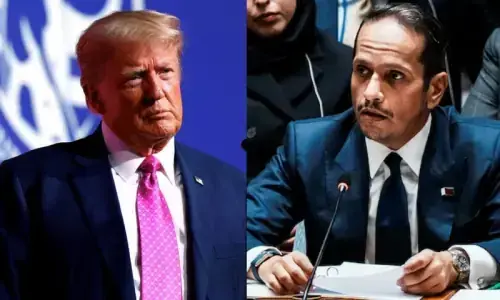When news broke of an Israeli airstrike in Doha targeting Hamas leaders, it didn’t just stir regional tensions—it also launched a flurry of high-level diplomacy. In response, U.S. President Donald Trump invited Qatar’s Prime Minister—and Foreign Minister—Sheikh Mohammed bin Abdulrahman bin Jassim Al Thani, for a dinner in New York. The meal wasn’t just about food; it was a signal.
Here’s what’s going on, what this means for regional diplomacy, and what we might see next.
🔍 What Sparked the Meeting
Earlier in the week, an Israeli strike in Doha killed several Hamas members and one Qatari security officer. The site of the meeting was reportedly a gathering of Hamas officials in Doha in talks over a deal connected to Gaza ceasefire negotiations. The strike drew sharp criticism from Qatar and others, partly because of concerns that it could undermine peace efforts. AP News+3Reuters+3Al Jazeera+3
The strike risked derailing U.S.-backed mediation efforts aimed at ending or reducing hostilities around Gaza. Qatar has acted as an important broker in past ceasefire efforts and hostage-release negotiations. Reuters+2Wikipedia+2
💬 What Trump and Al-Thani Discussed
During their meeting, accompanied by key U.S. officials (including Vice President JD Vance, Secretary of State Marco Rubio, and special envoy Steve Witkoff), several issues came to the forefront:
Trump expressed displeasure over the Israeli strike. He called it unilateral and warned that such actions hurt both U.S. and Israeli interests. “Very unhappy,” he said, notably. Reuters+1
The talks emphasized the role Qatar plays as a mediator, especially in the ongoing Gaza conflict: managing ceasefire negotiations, facilitating hostage exchanges, and crafting a post-conflict plan. Qatar reaffirmed its commitment to that mediation role despite the tensions. Reuters+2Al Jazeera+2
Defense cooperation came up. The U.S. wants to assure Qatar’s security and sovereignty after the strike. Both sides are reportedly exploring how to strengthen their strategic partnership in light of the recent attack. Al Jazeera+2Reuters+2
🌍 Why This Matters
Diplomatic balancing act: The U.S. supports Israel in many ways, but this meeting shows that Washington also needs to maintain trust with Gulf allies like Qatar, who are key players in any peace process in the Middle East. If allies feel blindsided by Israeli actions, it can damage cooperation. Reuters+2Al Jazeera+2
Preventing escalation: Strikes like the one in Doha have ripple effects—diplomatic fallout, shifting alliances, public outcry. Meetings like this are a way to calm things down, to show that such escalation won’t become the “new normal.” Al Jazeera+2Reuters+2
Support for mediation: Qatar’s role as go-between in the Israeli-Hamas conflict has been central for years. By hosting its Prime Minister and expressing concerns about the strike, Trump is signaling that the U.S. sees Qatar’s mediation as valuable and is willing to protect it. Reuters+2Wikipedia+2
⚠️ Tensions Still Real
Despite the diplomatic outreach, not everyone is at ease. Many in the region see the strike as a violation of Qatari sovereignty, and there’s concern that such actions could damage trust. Al Jazeera+1
There’s also the risk that Israel-U.S. relations could strain if unilateral actions like this continue without coordination. Trump’s public criticism of the strike suggests that even strong alliances are being tested. Reuters+1
Lastly, people will be watching whether this meeting leads to concrete steps: promises are one thing; changes in policy, protections, and agreements are another. The real test is implementation.
🔭 What to Watch Next
Here are the key things to keep an eye on:
Outcome of the New York dinner and meetings: Will there be a joint statement? Will Qatar insist on guarantees or formal changes in how such strikes are communicated or approved?
Effect on Israel-U.S. coordination: Will Israel change how it coordinates with the U.S. before carrying out strikes in sensitive locations like Doha? Will there be more pressure from Washington?
Qatar’s mediation role: Whether the strike changes how Qatar is seen – by Hamas, by Israel, by other Gulf states – as a neutral or semi-neutral player in peace efforts.
Public reactions across the region: How will citizens in Qatar, other Gulf countries, and beyond respond? Protests? Statements from other governments? That can shift the diplomatic tone.
Next diplomatic visits & summit behavior: We already know leaders from many Muslim and Arab countries are gathering in Doha for a summit to address this event. What resolutions or diplomatic stances will come out of that? Will this dinner help shape those resolutions?

Comments 0
No comments yet. Be the first to share your thoughts!
Leave a comment
Share your thoughts. Your email will not be published.